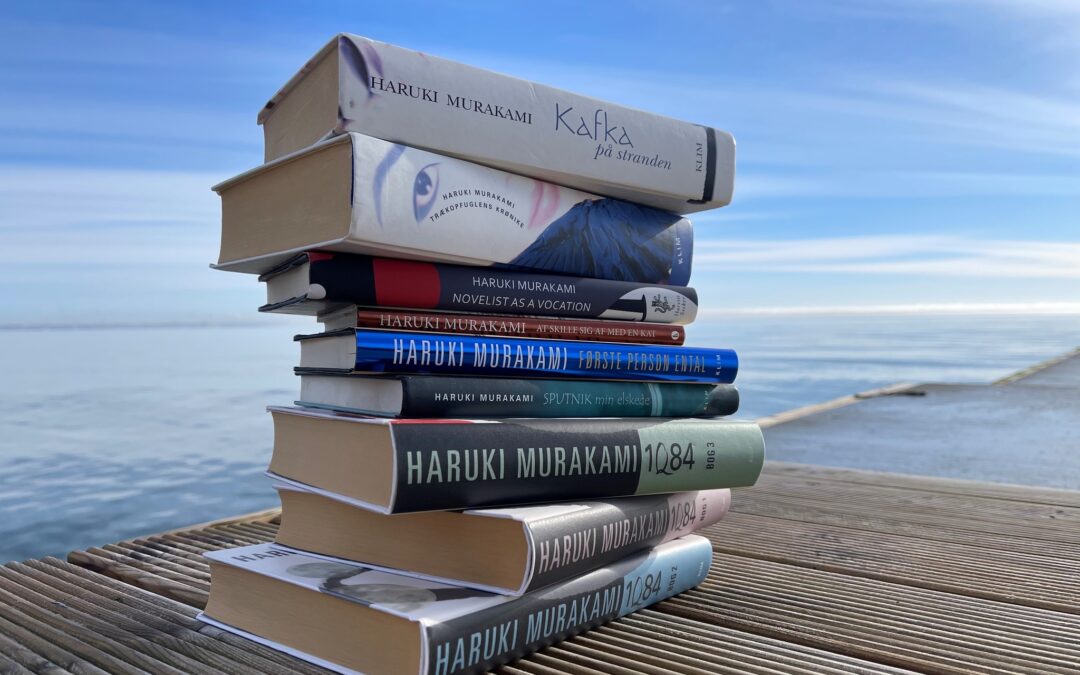(foto: Louisiana Museum of Modern Art)
He doesn’t care for social media, so we’re not allowed to take pictures. Is that why Haruki Murakami has managed to write so many great novels—because he’s undistracted by all that mess and mind clutter? I immediately think. “Writing and reading takes time… And that process is important,” he explains.
It’s widely known that he has his routines: wakes up at 4 AM, goes for a run. Every day for the past what, 40 years? And then he starts to write.
And that part of the process interests me the most. That’s why I bought a 4-day ticket to Louisiana, Museum of Modern Art in Northern Denmark, to be able to experience Murakami reading in Japanese (accompanied by a pianist on stage), answering questions from his readers, and hopefully see him face to face and get a signature.*
“I never write when I don’t want to. I only write when I feel like it. Writing should be fun!” he starts off as if writing was so easy and simple. I don’t believe him entirely – I think he’s playing some character here, maybe from one of his books: a joyful zen master with simple answers, but loads of underlying mystery.
Or maybe he’s just forgotten how painful writing was at times? After all, he claims that he doesn’t remember his own books and gets surprised every time he reads them.
Fortune cookies for Murakami
He seems like someone who’s very humble and wants to stay low-key. “I’m just an ordinary person. Nothing special. I never understood why people want to meet me,” he says with a cute Japanese accent. But I think that precisely this combination of humbleness and amazing imagination is why we are drawn to him so much.
There is a big basket on the floor, from which he is required to draw little papers with written questions. “It’s like getting a fortune cookie,” he says joyfully, and the crowd (sitting squeezed on the grass plains outside of the main tent) giggles.
Some questions he just passes, which is even increasing the aura of mystery surrounding him. Why did he pass this one? Was it too personal? Or dumb? Or complicated? We’ll never know.
Time for questioning
Do you struggle with finishing your books?
“No, I never have a problem with that. It’s natural, like sex – when it’s finished, it’s finished!”
Why are there so many cats in your books? And why are there often some holes in the ground?
“You know, we had an old well in the house when I was a kid. And I was often scared of it, the deep darkness inside. I am an only child, so I was often alone in our house. But I grew up with a cat – that was my companion. I learned to communicate sincerely, without words.”
I’m noticing that even during the interview, Murakami uses pretty simple words to describe something pretty unusual. Just like in his books!
Some describe your style as magical realism. What do you think of that?
“Well, critics, they need these boxes to put stuff in. But I think it’s wrong. I think my style is called Murakamism. They also said the same thing about Márquez, that he writes in magical realism. But you know what I think? I think he wrote about his reality. It was just his realism.”
I am an ET!
You often write in a simple, accessible language, but your realities are difficult and complex.
“That’s a great compliment, thank you! You know, a simple and easy story is no fun. You have to make the reader addicted! What will happen next?? Keep them curious. I myself am always curious. What will my characters do? I don’t know ahead of time.
And language… language is just a tool. Some writers try to use beautiful language, you know, complicated. I don’t need it.
I use it the same way ET used simple objects to create some technically advanced machines – such as an umbrella and a cup to make a system to communicate with other worlds. I am an ET!”
What advice would you give to an aspiring young novelist?
“Well… I don’t know! Because I never was an aspiring young novelist! I worked in a jazz club, and when I turned 29, I just wanted to write something. It was simply my passion.
So, I guess my advice is: Have some fun. If it’s not fun, it’s not worth writing.”
Do you see your characters in your mind? What they look like etc.?
“No. I don’t see them. I just have a sense of their existence.”
And is it weird to see the illustrations of your books afterward? For example, this shark from one of your stories on the cover of the story collection…
“Wait, there is a shark in my story??!”
The instinct to write
How do you feel about other people’s interpretation of your books?
“I don’t trust the individual reader. But I trust my readers as a whole. When you write, you don’t have any interpretation, only instinct. The instinct to write—and you trust that.”
What would you like your legacy to be?
(laughs) “I think it’s too early to talk about it! I used to think I’ll live to 100, but now I’m thinking maybe 95. Anyway, reputation is a very unstable thing. Take Hemingway, for example. So no, I don’t think about my legacy. Maybe people will remember my stories, maybe not…”
There is so much pain in your books…
“Is there? I haven’t noticed it! But I would say the stories are here to heal the human mind and heart. They are a remedy for injuries of the heart. And I change the tragic into something different.”
What to take from all that?
One curiosity about Murakami is that he is a collector and owns about 13,000 vinyl records. It gives him joy to polish them and to be present for the music. And I guess that’s what could help our creativity too – ditch the social media distractions, pay attention, and have fun. And don’t think about your legacy too hard!
P.S.: If you struggle to tap into your creative side, let me support you through creative coaching!
*I’ve gotten my signature, and even a few sentences about Prague, and it was sheer luck, because we were waiting in line for 2 hours and were amongst the last ones who still made it to the author. Or was I in a parallel world where exactly this was bound to happen?




Recent Comments